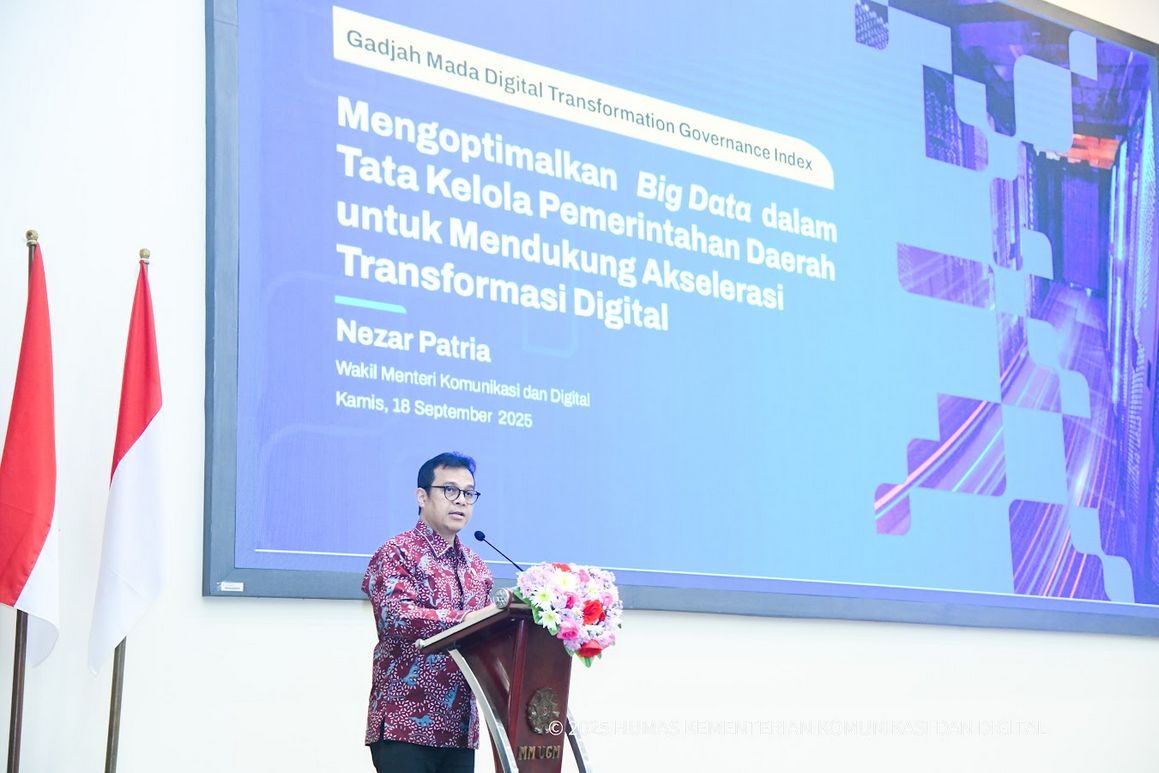Big data is now becoming a new weapon for accelerating digital transformation at the regional level. Deputy Minister of Communication and Digital, Nezar Patria, emphasized that the abundance of data from digital activities can form the foundation for faster, more accurate, and accountable public policies.
“Utilizing big data allows us to make a big leap in the public sector. Big data offers accuracy and speed, enabling faster execution of public services,” said Nezar during the National Seminar on Optimizing Big Data in Local Government Governance to Support Digital Transformation Acceleration at Sukadji Ranuwihardjo Auditorium, Master of Management, FEB UGM, Yogyakarta, Thursday (18/09/2025).
Accurate, Fast, and Accountable Public Policy
According to Nezar, the availability of digital infrastructure has resulted in a massive volume of data. When managed properly, this data strengthens the accountability of public policymaking.
“Government-built connectivity now reaches 97 percent of inhabited areas. Internet penetration is now around 80 percent of the total population, or equivalent to 222 million people. All digital activity produces valuable data for policymaking,” he explained.
Data Integration and the One Data Indonesia Initiative
Nezar stressed the importance of consolidating data through the One Data Indonesia initiative to ensure data quality and improve the effectiveness of government decision-making.
“Misreading data can impact the policies taken. That’s why One Data Indonesia is important to ensure data quality. Regional governments also need to actively integrate their data into that portal,” he said.
Cybersecurity and Public-Private Collaboration
Despite the promising opportunities, Nezar warned of serious threats, such as data breaches and low cybersecurity awareness in several regions.
“In the cyberattack on the national data center, the breach occurred through one district because of a weak password. This highlights the importance of discipline and data security standards,” he stated.
Citizen-Generated Data and Crowdsourcing
He presented two strategies to optimize big data governance: public–private partnerships and community participation through citizen-generated data and crowdsourcing.
“Big data governance can be pursued through public–private partnership mechanisms. In addition, the government can involve the community in research based on citizen-generated data and utilize crowdsourcing while prioritizing personal data protection,” he explained.
Data Labs and Regional Best Practices
Nezar gave an example of successful big data use in Sumedang District, which has succeeded in reducing stunting rates.
“Sumedang District uses digital platforms to monitor pregnant women and nutritional intake. Data-based intensive monitoring has proven effective in significantly reducing stunting,” he said.
To strengthen digital innovation in the regions, he encouraged the establishment of data labs as experimental spaces for local governments to develop and test technology solutions.
“Regional governments can build data labs as experimental units to test solutions quickly. This way, digital innovation can be applied according to community needs,” he added.
Nezar was accompanied at the event by Mira Tayyiba, Director General of Digital Government Technology, Ministry of Communication and Digital Affairs.
PHOTO: KEMKOMDIGI
This article was created with AI assistance.
Read More






 Friday, 06-02-26
Friday, 06-02-26







